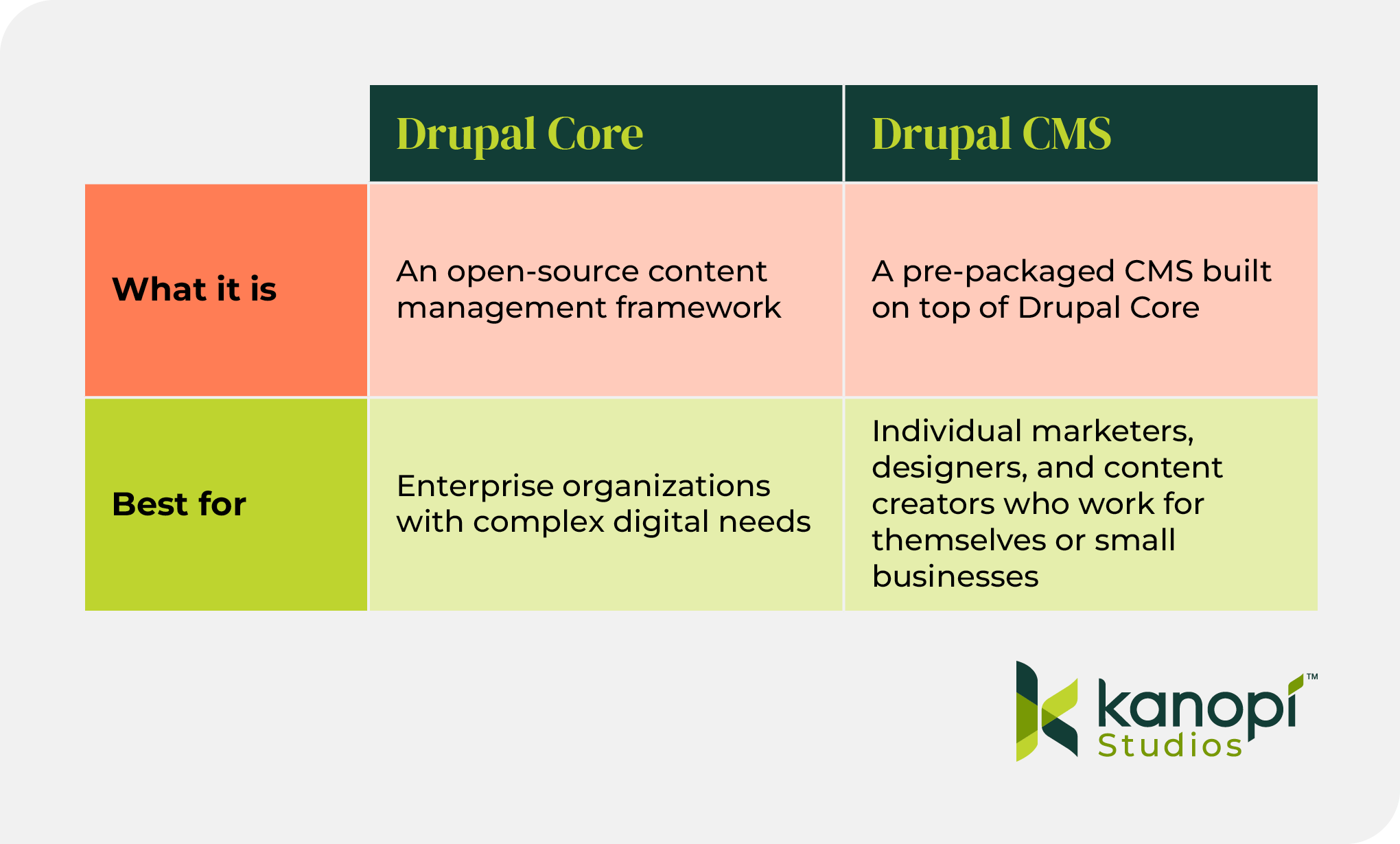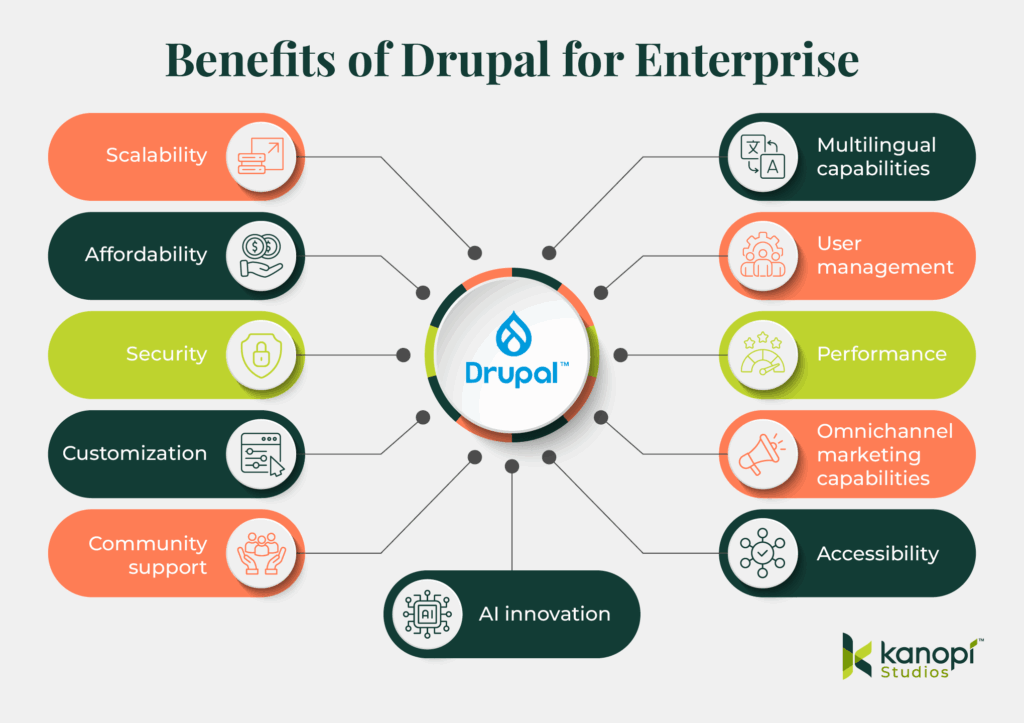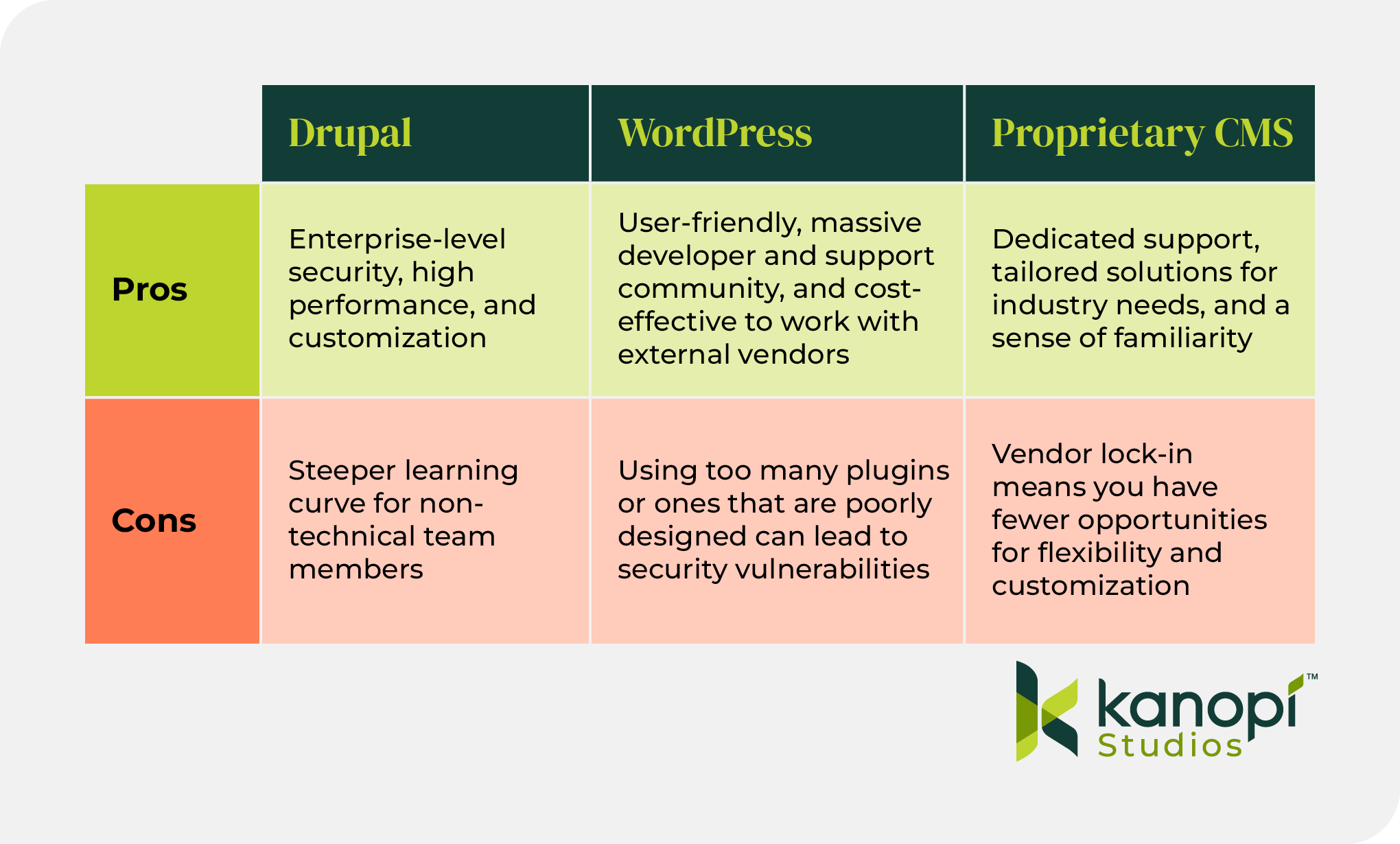Drupal powers just 1.1% of websites with known content management systems (CMS). But among that population are a number of heavy-hitter organizations with complex digital needs: GE, Whole Foods, Tesla, and Charles Schwab, to name a few. Why do these enterprise-level organizations turn to Drupal for their website needs?
Drupal is well-equipped to handle complex business needs and process large volumes of data while maintaining robust security. This guide explores the benefits of Drupal for Enterprise and offers guidance on how to implement this CMS. We’ll cover:
- What is Drupal for Enterprise?
- 11 Key Benefits of Drupal for Enterprise
- Drupal’s Enterprise-Focused Features
- Comparing Enterprise Drupal Solutions to Other CMS Platforms
- Considerations for Implementing Drupal for Enterprise
- How Kanopi Can Support Your Enterprise Drupal Journey
What is Drupal for Enterprise?
Drupal for Enterprise is the use of the Drupal content management platform by enterprise-level businesses to design, develop, and manage their digital presence. Drupal offers two options for content management:

- Drupal Core is an open-source content management framework tailored to large organizations with complex data needs that want to create robust digital experiences. Enterprise organizations choose Drupal Core for its flexibility and scalability, allowing them to effectively serve their audiences and keep their data organized and safe.
- Drupal CMS is a pre-packaged CMS built on top of Drupal Core. This tool makes it easy to create a basic website quickly and doesn’t require advanced technical skills or custom coding. As a result, Drupal CMS is better suited for individual marketers, designers, and content creators who work for themselves or small businesses.
Drupal Core is constantly updated with fixes and new features. The current version of the platform is Drupal 11, and it offers multiple useful features for web developers. These tools include workspaces for testing content, enhanced navigation, and simplified front-end development.
11 Key Benefits of Drupal for Enterprise
What sets Drupal apart as a top CMS solution for enterprises? These are the top benefits that drive users to this platform:

- Scalability. This CMS prioritizes high performance and fast load speeds, and offers various resources and tools to help enhance performance. Because of this, it’s easy to scale up your website to serve thousands or millions of users. In addition, Drupal’s modular infrastructure enables simple scalability without impacting page performance or user experience.
- Affordability. Drupal is an open-source solution, meaning anyone can freely access and change the source code based on their needs. You’ll still have to factor in additional costs such as hosting and web development, but you won’t need to worry about platform fees.
- Security. Drupal has a strong reputation for being highly secure. Because it is an open-source platform, anyone can review the code and propose security fixes, ensuring greater oversight of the solution. As an open-source CMS, Drupal is not incentivized to hide any real or potential security vulnerabilities.
- AI innovation. Drupal recently launched an official AI initiative that builds on the free and open source community to integrate and innovate site building with AI. Drupal already had a strong AI foundation thanks to community members who’ve built AI modules. With this initiative, Drupal seeks to incorporate AI directly into its CMS with responsible innovation.
- Customization. Drupal is considered highly customizable because of its modular architecture. That means developers can enable or disable certain features to update a website without affecting the entire site infrastructure. Additionally, Drupal has extensive theming capabilities, allowing developers to customize a website based on unique branding needs.
- Community support. Drupal’s open-source nature means it offers a broad developer community to which you can turn for advice, support, and expertise. You can also explore multiple developer options to find the right service provider.
- Multilingual capabilities. This CMS offers translations in over 100 different languages. As a result, many enterprises turn to this solution to deliver localized content for an international audience.
- User management. Drupal makes it easy to control which team members can access different parts of your website through user permissions and roles. Permissions determine the actions that users can perform based on their access level. Instead of assigning individual permissions to each user, they are organized into roles, making it easier to manage access for all team members.
- Performance. Studies have shown that the optimal page load speed for a website is under three seconds, and the longer a page takes to load, the higher the likelihood that a visitor will leave the page. Drupal uses advanced caching mechanisms during follow-up visits to enhance the site’s loading speed. It also offers tools for lazy loading, database optimization, and responsive images.
- Omnichannel experiences powered by headless capabilities. Drupal can be configured as a headless CMS, meaning the back end (where content is created and managed) is separated from the front end (what users see on screen). This decoupled structure allows content to be delivered via APIs to any digital platform, whether it’s a website, mobile app, digital kiosk, signage, or mobile push notification. Instead of recreating content for each channel, teams can publish once and distribute it anywhere, ensuring consistency and saving time.
- Accessibility. More than 44 million people in the U.S. and 1.3 billion people worldwide live with disabilities. Drupal aims to improve web accessibility for these individuals so that anyone can access the content they’re looking for. The platform conducts thorough automated accessibility testing, supports assistive technologies for content access, and has a dedicated accessibility team that identifies and fixes accessibility issues.
Drupal is not a perfect platform; no CMS is. But its commitment to continuous improvement, community-led problem-solving, and transparency makes it a top choice for many enterprise organizations worldwide.
Drupal’s Enterprise-Focused Features
Drupal offers tailored solutions to meet any enterprise needs. Here are a few of the common types of enterprise websites on Drupal and how the platform supports them:
Retail
How Drupal supports retail sites: Scalability, integration with other enterprise systems like a customer relationship management solution (CRM), omnichannel content delivery, global asset library, pricing structures, and shopping cart modules.
Example website: Lush (skincare and beauty products)
Services
How Drupal supports service sites: Microsite accommodation, intuitive forms, simple content editing, and SEO optimization.
Example website: COIT (cleaning and restoration services)
eCommerce
How Drupal supports eCommerce sites: Simplified checkouts, robust search interfaces, rich product pages, and high security standards.
Example website: PayPal (online payment processing)
Travel
How Drupal supports travel sites: Scalability, mobile-responsiveness, and multilingual capabilities.
Example website: Princess Cruises (cruise liner)
High tech
How Drupal supports high-tech sites: Scalability, flexibility, and multilingual capabilities.
Example website: Verizon (wireless, internet, and phone service provider)
Fintech
How Drupal supports fintech sites: Strong security, robust integrations, and risk management.
Example website: TCA Venture Group (angel investors)
Comparing Enterprise Drupal Solutions to Other CMS Platforms
While searching for the best CMS for your enterprise needs, you’ve likely come across a wide range of options, each with a unique feature set and benefits. So, how does Drupal stack up against other solutions? Let’s explore some of the major pros and cons of Drupal and other popular enterprise platforms.

Drupal vs. WordPress
WordPress is another popular, open-source CMS solution for enterprise businesses. It’s by far the most commonly used CMS worldwide, powering over 60% of websites with a known CMS.
When comparing Drupal to WordPress, remember that both platforms can offer the robust capabilities you need to build a complex, performant website. However, here are a few key areas where each solution shines:
- Where WordPress Wins: User-friendly, massive developer and support community, and cost-effective to work with external vendors. Drupal can have a steeper learning curve for non-technical users.
- Where Drupal Wins: Enterprise-level security, high performance, and customization. WordPress can struggle with performance issues when sites have too many plugins or poorly designed ones.
You can work with an experienced web developer (like the experts at Kanopi Studios) to help determine which of these CMS solutions will work best for your enterprise.
Drupal vs. Proprietary Solutions
As mentioned, Drupal and WordPress are open-source platforms that allow anyone to view and modify the source code according to their needs. In contrast, some CMS platforms are closed or proprietary, meaning the source code is managed and controlled by a single entity (the software provider). Examples of proprietary CMS software include Adobe Experience Manager and Sitecore.
Here are the key differences between proprietary and open-source software like Drupal:
- Where Proprietary CMSs Win: Dedicated support, tailored solutions for industry needs, and familiarity if you’re already using other tools from the provider (like your CRM or marketing platform).
- Where Drupal Wins: Affordability, flexibility, ownership of the code for complete customization and portability, broad community support, and continuous improvement. Drupal takes the cake when it comes to customization opportunities and site scalability.
Choosing between proprietary and open-source software is up to your organization, and there is no right or wrong answer. Work with Kanopi to fully understand your options and choose the best path for your business.
Considerations for Implementing Drupal for Enterprise
After selecting Drupal as your enterprise CMS, you must work through the essential considerations of the Drupal planning and development process. Determining how you will approach each of these development steps will help set your site up for long-term success:
- Migration. If you’re already using Drupal, you may have to upgrade your site to a new version, such as migrating from Drupal 7 to Drupal 11. If you use another CMS like WordPress and want to move to Drupal, you must undergo a more complex migration to maintain data integrity. Partner with a web development specialist to make the process painless.
- Hosting. A website host is the technology that provides the infrastructure to store your website’s files and make it accessible to anyone using the Internet. To figure out the right website host for your needs, partner with a web development agency with deep industry connections, like Kanopi. We have strong partnerships with hosts like Pantheon, Platform.sh, and Acquia, which allow us to recommend the right hosting platform for your unique requirements.
- Integrations. Determine whether you must integrate your CMS with other tech solutions, such as your CRM, enterprise resource planning (ERP) system, or marketing automation platform. Drupal offers plenty of modules for integrating your site with thousands of other tech solutions.
- Support. Deciding how to maintain your Drupal website is another essential planning element and an additional cost. The Drupal website maintenance process involves backing up your site, updating Drupal Core, optimizing page performance, enhancing security, and other ongoing updates.
Partnering with a dedicated technology consultant like Kanopi makes addressing these considerations convenient and straightforward. Your consultant can provide the advice, technical solutions, and support you need to quickly get your site up and running, manage costs, and maintain your web presence over time.
How Kanopi Can Support Your Enterprise Drupal Journey
Enterprise websites have complex needs; no web development agency understands that better than Kanopi Studios. Our Drupal services are tailored to enterprises’ unique web requirements, and we develop custom development roadmaps and solutions for every organization we work with.
Our Drupal Development Process
- Migrations: We’ll help you transfer your site to Drupal from another CMS, switch hosting providers, or upgrade to a newer version of Drupal.
- Custom development: Our developers create custom Drupal modules to broaden your site’s functionality and exceed your audience’s expectations.
- Third-party integrations: We augment and expand on Drupal’s base platform by setting up seamless integrations.
- Mobile-first design: Our Drupal themes are mobile-responsive by default, ensuring a positive user experience on every device.
- Commitment to accessibility: Accessibility is baked into every aspect of our web design and development process, and our websites comply with at least level AA of the Website Content Accessibility Guidelines (WCAG) 2.1 (the second-highest level of accessibility compliance).
- SEO expertise: We make it easy for visitors to find your enterprise website through keyword optimization, structured data, and local SEO best practices.
- Holistic support: Our support services include security patches, module upgrades, ongoing performance enhancements, and content refreshes.
Watch this video to learn more about Kanopi’s unmatched website support services:
What Sets Kanopi Apart
- Experience: Our Drupal team members have an average of 11 years of experience with the platform, and most are Acquia and Pantheon certified (Acquia and Pantheon are industry-leading hosting platforms built for Drupal).
- Innovation: Kanopi is a Platinum Drupal Certified Partner, a founding sponsor of Discover Drupal, and regularly contributes to the Drupal Project (the collaborative effort to update and maintain Drupal through updates to modules, themes, security fixes, and documentation).
- Industry partnerships: As mentioned above, our powerful, long-standing partnerships with hosts like Acquia, Platform.sh, and Pantheon allow us to tailor our recommendations to your needs. Plus, Kanopi sponsors over half a dozen Drupal conferences annually.
- Dedicated to giving back: Kanopi supports over 50 free and open source projects on Drupal.org.
Additionally, one of our staff members, Jim Birch, is heavily involved in Drupal initiatives, including:
- Drupal core subsystem maintainer (Recipes and Default Content)
- Drupal core initiative coordinator (Recipes)
- Drupal CMS SEO track lead, committer, and advisory board member
- Drupal AI Initiative SEO track lead
Whether you need a complete website build, refresh, or ongoing support, Kanopi’s experienced team is ready to help at any stage of the web development process.
Wrapping Up
The larger the organization, the more significant its website requirements. With Drupal for Enterprise, your organization’s website will have the strong foundation it needs to grow alongside your operations and help you reach a broader audience. Kanopi’s support offers the expert guidance you need to achieve your goals faster.
Looking for more Drupal information? Start here with other resources written by our expert team members:
- Drupal Web Design: How an Agency like Kanopi can Help. Learn more about our Drupal web design services and the process we follow to bring your site to life.
- Drupal Security: 7 Strategies for Long-Term Protection. Leverage these best practices to make your Drupal site as secure as possible, increasing visitor satisfaction and trust.
- Why Open Source is the Marketer’s Choice in 2025. Explore why open-source CMS solutions are often the right choice for any organization’s marketing needs.









